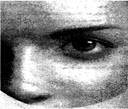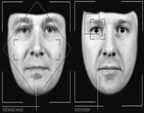题目内容
We already enjoyed on the farm
- A.work
- B.working
- C.worked
喜欢做什么事可用enjoy doing sth,故本题选B。

 新课标阶梯阅读训练系列答案
新课标阶梯阅读训练系列答案--- I’d like to introduce my best friend to you , Peter .
---- Thank you , Lucy . But we __________already .
| A.meet | B.met | C.will meet | D.have met |

Soon computers and other machines will be able to remember you by looking at your eyes! The programme works because everyone’s eyes are different. So in the future you won’t have to remember a number when you want to use a machine or take money out of a bank. You’ll just have to look at the machine and it will be able to tell who you are.
The eye-recognition(识别)programme is already being tested in shops and banks in the USA, Britain, Spain, Italy and Turkey. Soon, this technology will take the place of all other ways of finding out who people are.
However, scientists are working on other systems. Machines will soon be able to know you from the shape of your face or hand or even your smell! We already have machines that can tell who you are from your voice or the mark made by your finger.
Eye-recognition is better than other kinds because your eyes don’t change as you get older, or get dirty like hands or fingers. And even twins have different eyes, so the programme can be up to 94% correct, depending on how good the technology is. Some programmes may only be right 51% of the time. In Britain, it was found that 91% of people who had tried it said that they liked the idea of eye-recognition. In the future your computer will be looking at you in the eye. So smile!
【小题1】How does the eye-recognition programme work?
| A.You write your number. |
| B.You show your ID card. |
| C.You look at the machine. |
| D.You say your name. |
| A.Because eyes never change. |
| B.Because hands or fingers can get dirty. |
| C.Because people like the idea of the programme. |
| D.Because the programme is widely used around the world. |
| A.The programme is being tested in Japan. |
| B.Machines with other systems can also tell who you are. |
| C.91% of people like the idea of the programme. |
| D.Computers can remember you by looking at your clothes. |
| A.Introduction to some kinds of programmes. |
| B.Introduction to the eye-recognition programme. |
| C.The way how the eye-recognition programme works. |
| D.The places where the eye-recognition programme is tested. |

Soon computers and other machines will be able to remember you by looking at your eyes! The program works because everyone’s eyes are different. So in the future you won’t have to remember a number when you want to use a machine or take money out of a bank. You’ll just have to look at the machine and it will be able to tell who you are.
The eye-recognition(眼睛识别) program is already being tested in shops and banks in the USA, Britain and France. Soon, this technology(技术) will change all other ways of finding out who people are.
However, scientists are working on other systems. Machines will soon be able to know you from the shape of your face or hands or even your smell! We already have machines that can tell who you are from your voice or the mark made by your fingers.
Eye-recognition is better than other kinds because your eyes don’t change as you get older, or get dirty like hands or fingers. And even twins have different eyes, so the program can be up to 94% correct, depending on(依靠) how good the technology is. Some programs may only be right 51% of the time. In Britain, it was found that 91% of people who had tried it said that they liked the idea of eye-recognition.
In the future your computer will be looking at you in the eye. So smile!
【小题1】What is the advantage of using the eye-recognition program?
| A.You needn’t use a machine. |
| B.You needn’t remember a number. |
| C.You needn’t look at the machine. |
| D.You needn’t take some money with you. |
| A.You type in your number. | B.You show your ID card. |
| C.You look at the machine. | D.You say your name. |
| A.Because eyes hardly change. |
| B.Because hands or fingers can get dirty. |
| C.Because people like the idea of the program. |
| D.Because the program is widely used around the world. |
| A.Remembering eyes. |
| B.Remembering smells. |
| C.Remembering fingerprints. |
| D.Remembering the shape of faces. |

